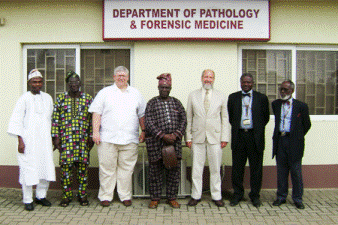Natural Resources, School of

Karl Reinhard Publications
Document Type
Article
Date of this Version
1994
Citation
Historical Archaeology, 1994
Abstract
One focus of historical archaeology at Harpers Ferry National Historical Park, West Virginia, is tracing the development of sanitation at the town through the 1800s and 1900s. Historical documentation indicates that there was a degree of resistance to the modernization of village sanitation. This study attempts to verify this resistance through examination of privy soils for parasites indicative of fecalborne disease, specifically the helminth species Ascaris lumbricoides and Trichuris trichiura. The presence of these parasites in the early 1900s would indicate that fecal-borne disease due to poor sanitation continued to be an aspect of town life. The analysis revealed the eggs of both species in all three privies, indicating that resistance to modem sanitation resulted in the maintenance of fecal-borne disease.
Included in
Archaeological Anthropology Commons, Ecology and Evolutionary Biology Commons, Environmental Public Health Commons, Other Public Health Commons, Parasitology Commons

